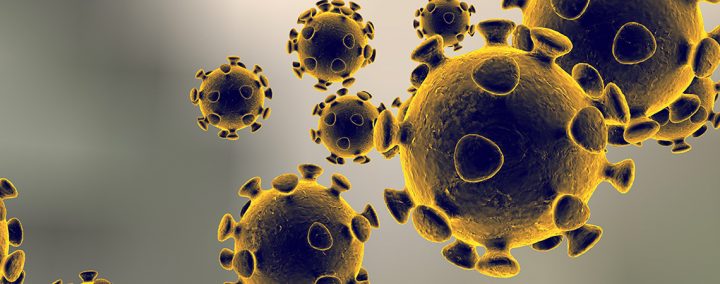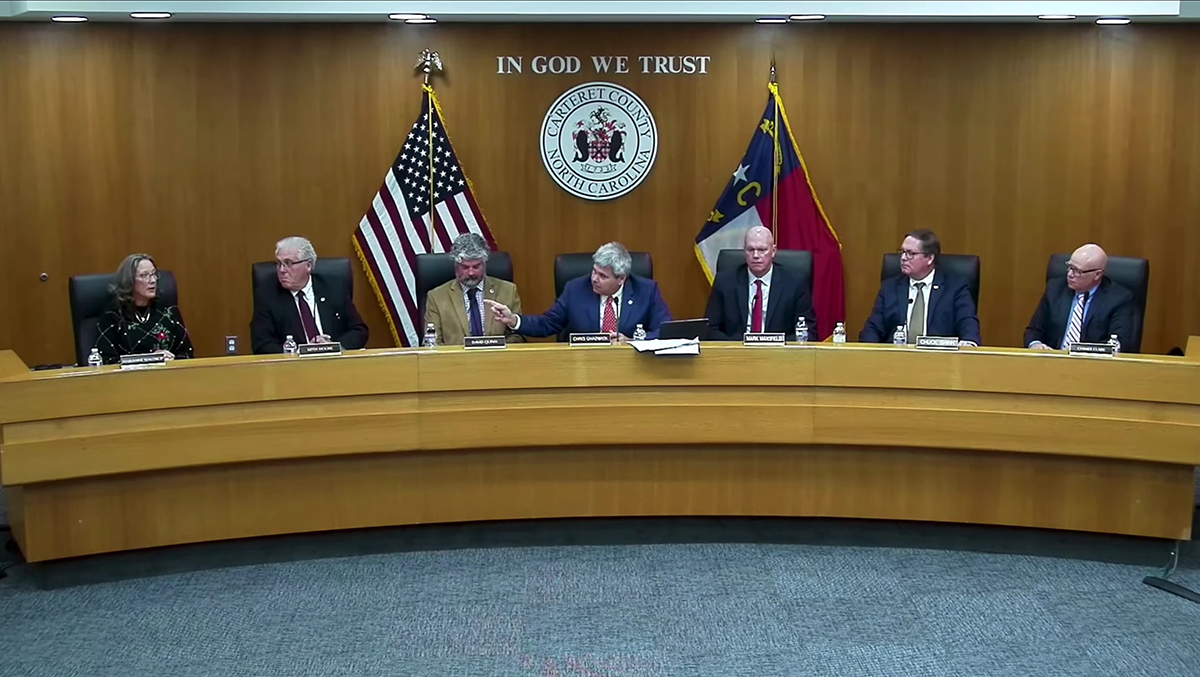
Updated at noon Wednesday with most recent case numbers
North Carolina will likely see the number of COVID-19 cases accelerate, health officials say, but not all coastal communities are responding alike.
Supporter Spotlight
“We’re going on the assumption that we had community spread even before we had documentation of community spread. I think you can see our numbers are going up,” Dr. Betsey Tilson, state health director and chief medical officer for the state Department of Health and Human Services, said Tuesday afternoon during a press conference.

“We don’t have lab documentation of all the infections. I think we are in acceleration spread,” she said, which is why the governor has been putting in place community-based measures.
She added that the state has been proactive and will continue to be, because they see acceleration spread. “We want to double down on everything that we can do for our state to flatten that curve. We know it’s going to go up and we want that curve to be as less steep and as flattened as possible.”
Gov. Roy Cooper in a letter to President Trump requested a major disaster declaration for the State of due to the continuing impacts of COVID-19, his office announced late Tuesday.
“It’s important that we help North Carolinians stay protected from the health impacts of COVID-19 and recover economically from the financial impacts this crisis is having on our state,” Cooper said in a statement.
Supporter Spotlight
Cooper, as part of the major disaster declaration, has asked the federal government to provide individual assistance for those affected, including crisis counseling, disaster unemployment assistance and Small Business Administration assistance, among other programs.
Tilson began the media briefing Tuesday afternoon by explaining that the federal Centers for Disease Control and Prevention, or CDC, now recommends that those who think that they may have COVID-19 and have mild symptoms should stay home, separate themselves from others and call their doctor for medical advice.
According to the CDC, those at high risk include people who are 65 and older or have a high-risk condition such as a chronic lung disease, asthma, heart disease with complications compromised immune system, severe obesity, or other especially poorly controlled underlying medical conditions like diabetes or kidney problems, she said.
Current data does not show a specific increased risk for COVID-19 in pregnant women. While children are generally at a lower risk for severe infection, some studies point to a higher risk for infants.
Tilson said that those with mild illness who recover at home can return to their normal activities when they can answer “yes” to all three of these questions: Has it been seven days since you first had symptoms? Have you been without fever for three days without any medicines for fever? And are your other symptoms improved?
“Once you can say yes to all that then you can go back into your life,” she said.
Anyone with more serious or worsening symptoms such as worsening shortness of breath, difficulty breathing chest pain or pressure, confusion or blue lips should call 911 right away.
“We already know that we’re not capturing or identifying all the cases in North Carolina — I think we’ve talked a lot about this — there’s people with very mild symptoms or no symptoms,” Tilson said.
She explained the way to understand the spread across the state is not to try to test everybody. Instead, they’ll use the evidence-based surveillance strategies used to understand the spread of influenza across the state and apply that to COVID-19. “That will give us a much more evidence-based, science-driven data on the spread of disease and then that will help us understand, ‘Do we need to put more social distancing and community mitigations and strategies in place?’ or can we start pulling them back so that’s the pivot that we’re going to be doing.”
The department released a new fact sheet to help North Carolinians know what to do if they are sick and what could happen if someone with mild illness leaves home to be tested. “They could expose themselves to COVID-19 if they don’t already have the infection and if they do have an infection with COVID-19, they could give it to somebody else, including somebody in their community at high risk for complications or a healthcare provider who will be needed to care for people with more severe illness,” she said.
Tilson said regarding testing, it’s most important for those who are seriously ill, in the hospital, in a high-risk setting, like a long-term care facility or a nursing home, and healthcare workers and other first responders who are caring for those with more serious infections with COVID-19.
“This is particularly important as we face a nationwide shortage of personal protective equipment,” she said. “We need to be mindful so that our health care providers have the supplies they need to care for people who need medical attention.”
Mike Sprayberry, director, North Carolina Division of Emergency Management, said that globally there are shortages of personal protective equipment. “We know that we don’t have as much as we need, but we are working to get as much as we can. And that is the number one priority over the next few days.”
He said early in the conference Tuesday that this is day 15 of our activation in the State Emergency Operations Center for COVID-19. As of that afternoon, 49 counties have activated county emergency operations centers and 94 counties have declared states of emergency.
“This morning we received our second allocation of personal protective equipment from the federal Strategic National Stockpile,” he said. The shipment included included N95 respirators, surgical masks, face shields, surgical gowns and gloves, which were dispersed to medical facilities across the state. A similar shipment of supplies was received last week and dispersed as well.
These supplies are also being sourced on the private market and donations of personal protective supplies are coming in from corporations and individuals, he added.
NCDHHS reported late Wednesday morning the first COVID-19 associated deaths in the state. The patient from Cabarrus County died March 24 from complications associated with the virus. The patient was in their late 70s and had several underlying medical conditions. A second person in their 60s from Virginia who was traveling through the state also died from COVID-19 complications.
Statewide cases as of 10:35 a.m. Wednesday totaled 504, according to NCDHHS. As of noon Wednesday, the following cases have been reported on the coast: Hertford and Pasquotank counties have one confirmed COVID-19 case each; two in Beaufort County: three each in Bertie, Craven and Onslow counties; five in Carteret County; 10 in Brunswick County; and 10 in New Hanover County.
Dare County Department of Health and Human Services announced its first case Wednesday morning. It will not show up as a Dare County case with the NCDHHS because a Dare County address was not used when the person was tested.
Closures, restrictions along NC coast
While some coastal towns and villages were quick to force visitors out, others, including some towns on Bogue Banks in Carteret County, have taken an apparent wait-and-see approach in their response.
Brunswick County beach towns have closed all town facilities, restricted public gatherings to 10, a minimum 6 feet apart, at parks and on beaches and prohibited new short-term rentals.
In Sunset Beach, rental agencies and property owners with current short-term rental occupants are required to notify the occupants that they must vacate and leave town no later than 5 p.m. Thursday.
Ocean Isle Beach says all current short-term renters must leave town by 2 p.m. Wednesday. New rental occupancies of any nature or duration or prohibited until April 6.
Holden Beach is giving short-term renters until 2 p.m. Saturday to leave. New rentals are prohibited until April 4.
Short-term renters in Oak Island were asked to leave Tuesday and rentals discontinued through April 30.
Bald Head Island is under a voluntary evacuation but shut down access last Thursday, except for residents and property owners, and short-term rentals on Sunday. Restrictions are to remain in place through Thursday April 30.
New Hanover County towns of Wrightsville Beach and Kure Beach had not restricted short-term rentals as of Tuesday, but Carolina Beach ended vacation rentals Tuesday with current visitors to be out by 2 p.m. Friday. Kure Beach was set to hold a continued emergency meeting Tuesday evening. Wrightsville Beach previously closed its beaches to residents and visitors, but as of Tuesday, visitors were still able to enter and leave town without going through a checkpoint and displaying a reentry pass.
Topsail Beach is not allowing new rental occupancies until April 22. Those already staying in a rental property can finish their stay but no later than April 4.
Surf City renters and guests are to leave no later than 2 p.m. Wednesday. As of Monday, no new rental occupancies of a duration less than 90 days will be allowed.
North Topsail Beach is enforcing restrictions from Saturday through April 25. Renters who have checked-in and their rental extends beyond March 28 will be allowed to finish their stay but cannot extend.
In Carteret County, no restrictions on rentals are announced but Atlantic Beach recommends visitors stay away. Social gatherings of more than 10 are prohibited and the town urges vacation and hotel management companies to refuse reservations to leisure travelers until April 6.
Hyde County Monday announced that nonresident property owners not actively working on repairing their homes are no longer permitted entry to Ocracoke. Contractors working on Ocracoke properties are permitted access. These two groups will need to submit an application for a temporary permit to access the island.
Visitors and nonresident property owners are barred from entering Dare County.
And access to the Currituck County section of the Outer Banks is denied to visitors and nonresident property owners.
Fort Fisher State Recreation Area and Fort Macon State Park are closed because of county beach and travel closures and county declarations of state of emergency. Jockey’s Ridge State Park is open only to residents of Dare County.
Statewide closures
Monday, Gov. Roy Cooper extended school closures statewide to May 15, closed close-contact businesses and limited visitors to long-term care centers, effective Wednesday.
Grocery stores and restaurants providing takeout and delivery are to remain open.
The following types of businesses are to be closed by 5 p.m. Wednesday in order to stay within the lowered threshold on crowds of more than 50 people:
- Bingo Parlors, including Bingo sites operated by charitable organizations
- Bowling Alleys
- Indoor Exercise Facilities, such as gyms, yoga studios, martial arts facilities, indoor trampoline and rock-climbing facilities
- Health clubs
- Indoor pools
- Live performance venues
- Movie theaters
- Skating rinks
- Spas
- Sweepstakes lounges
- Video game arcades
- Barber shops
- Beauty salons, including waxing and hair removal centers
- Hair salons
- Nail salons/manicure/pedicure providers
- Massage parlors
- Tattoo parlors
Cooper highlighted the need for medical and health care workers and urged qualified, available professionals to volunteer by signing up at ncdhhs.gov/coronavirus, especially doctors and nurses, pharmacy, imaging and respiratory care, and facility maintenance and administrative support workers.
Editor Mark Hibbs contributed to this report.







